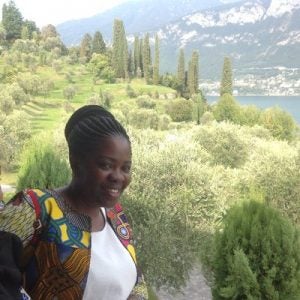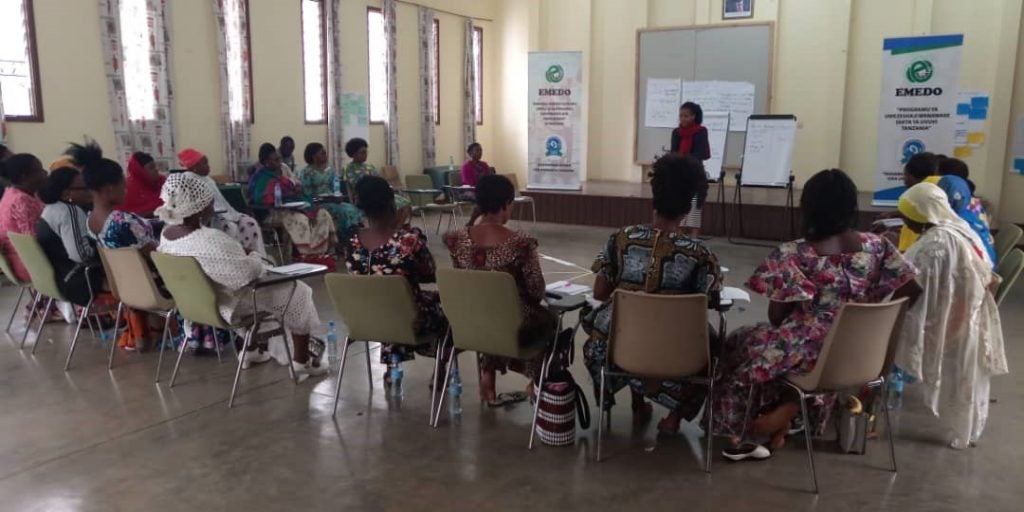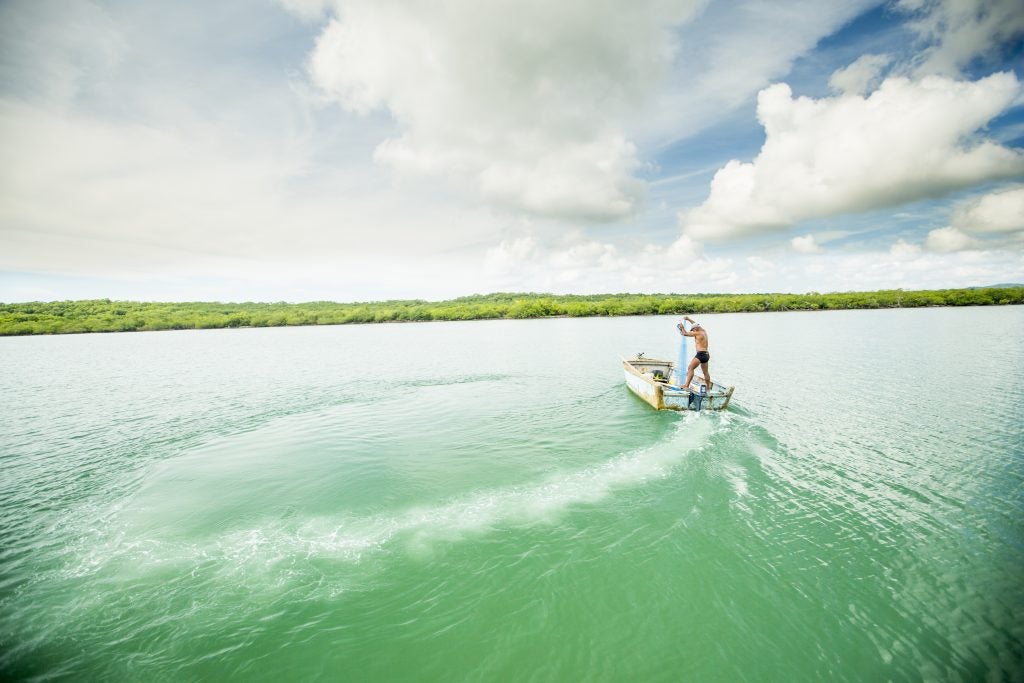By Editrudith Lukanga
 Editrudith Lukanga is a global leader on small-scale fisheries issues, addressing challenges such as gender equity, food security and poverty alleviation. She lives in Tanzania and is the founder and executive director of the Environmental Management and Economic Development Organization, a non-profit development organization working on environmental and socioeconomic challenges in her country. Her commitment to supporting small-scale fishing communities led to the establishment of Tanzania Women Fish Workers Association. She also serves as co-president of the World Forum of Fish Harvesters and Fish Workers and is secretary general of the African Women Fish Processors and Traders Network.
Editrudith Lukanga is a global leader on small-scale fisheries issues, addressing challenges such as gender equity, food security and poverty alleviation. She lives in Tanzania and is the founder and executive director of the Environmental Management and Economic Development Organization, a non-profit development organization working on environmental and socioeconomic challenges in her country. Her commitment to supporting small-scale fishing communities led to the establishment of Tanzania Women Fish Workers Association. She also serves as co-president of the World Forum of Fish Harvesters and Fish Workers and is secretary general of the African Women Fish Processors and Traders Network.
As the COVID-19 pandemic encircles the globe, disrupting everything in its path, the fishing sector is among the hardest hit. Nowhere is this more evident than in the rural villages and small-scale fishing communities that depend on the sea, lakes and rivers for their food and livelihoods. The virus is posing a deadly risk due to crowded fishing boats, processing facilities and markets where fisherfolk must still go to sell their products. And this is clearly taking a toll on the nutrition and well-being of the billions who depend on fish for food. With few resources to battle the pandemic, the virus is putting into stark relief the impacts of the systemic inequities that plague small-scale fisherfolk. It should serve as a wake-up call so that when we emerge on the other side, we do so with heightened awareness of inequities and a stronger determination to create positive and lasting change.
From Vigo — Europe’s largest seafood auction — to Lake Victoria — Africa’s largest freshwater fishery — the pandemic is dramatically affecting fisheries and aquaculture food systems. And the challenges and inequities that face small-scale fisherfolk, especially women in developing countries, are being exacerbated by a virus cruelly indifferent to their circumstances. For example, women in the seafood sector frequently have jobs in processing facilities where social distancing is not possible, or in retail shops or village markets where exposure to the public puts them at greater risk, as this story from Seafood Source on the International Association for Women in the Seafood Industry explains.
But COVID-19 is only the most recent challenge to strain small-scale fishing communities. Climate change also disproportionately affects their food supply and livelihoods, with warming waters already causing a net loss of fishery productivity and abundance. What’s more, climate change itself is in fact the result of inequitable actions and decisions on the part of powerful actors. Artisanal fisheries in the tropics are among those with the smallest carbon footprints and least responsibility for the current climate crisis. Yet they are disproportionately impacted by climate change, since the tropics will lose fish as they migrate poleward toward cooler waters. It’s clear that action is needed to reverse the inequitable treatment and outcomes that coastal and inland fishing communities face.
 These sorts of challenges explain why I teamed up with others to organize a first gathering of women who went on to form the Tanzania Women Fish Workers Association that was launched in April 2019, coming together to tackle their perennial challenges of access to fish, access to credit, and poor and unsafe working conditions — all now made more difficult due to COVID-19. For similar reasons, together with African women fish workers, we launched the African Women Fish Processors and Traders Network in April 2017 with the objective of collectively sharing experiences and to advocate as “one voice” for sector reforms and development actions that empower women to leverage their capacity to access and sustainably manage and utilize Africa’s fishery resources for their well-being and that of society. Their moving stories of perseverance and ingenuity in the face of enormous odds spur me on every day to fight for their rights.
These sorts of challenges explain why I teamed up with others to organize a first gathering of women who went on to form the Tanzania Women Fish Workers Association that was launched in April 2019, coming together to tackle their perennial challenges of access to fish, access to credit, and poor and unsafe working conditions — all now made more difficult due to COVID-19. For similar reasons, together with African women fish workers, we launched the African Women Fish Processors and Traders Network in April 2017 with the objective of collectively sharing experiences and to advocate as “one voice” for sector reforms and development actions that empower women to leverage their capacity to access and sustainably manage and utilize Africa’s fishery resources for their well-being and that of society. Their moving stories of perseverance and ingenuity in the face of enormous odds spur me on every day to fight for their rights.
It’s high time that world leaders take a closer look at fisheries through an equity and gender lens. So, I welcome the fact that the High Level Panel for a Sustainable Ocean Economy, a group composed of a dozen heads of government from countries of all sizes and at all stages of development, has focused on improving ocean equity as one of their key aims. One of their commissioned “Blue Papers,” called “Towards Ocean Equity,” discusses how equity is critical to creating a sustainable ocean economy and outlines recommendations to achieve an equitable sharing of ocean resources.
I agree with the panel that “inequity manifests … in unfair distribution of commercial fish catches; limited political power of small-scale fishers, particularly women and other minority groups; limited engagement of developing nations in high-seas activities and associated decision-making; and consolidated interests of global supply chains in a few transnational corporations, with evidence of poor transparency and human rights abuses.” Such inequalities can have numerous causes, from historical and colonial legacies, to lack of access to and allocation of resources, to insecure territorial and tenure rights, and lack of financial resources or technological capacity. Governments need to tackle these causes with vigor and focus. The first and most important step is that fisherfolks are heard and that they take their rightful place at the decision-making table. Implementation of the Voluntary Guidelines for Securing Sustainable Small-Scale Fisheries in the Context of Food Security and Poverty Eradication (the SSF Guidelines), the first internationally agreed-upon instrument dedicated entirely to the small-scale fisheries sector, is a good start.
Excluding small-scale fishers and fish workers from decision-making does more harm than simply disenfranchising them; it also increases the risk of unsustainable use of the fisheries resources they rely upon, because it ignores their valuable — and largely untapped — local ecological knowledge and expertise. And as the panel’s Blue Paper acknowledges, women and indigenous groups are the most underrepresented in decision-making bodies, despite the myriad roles they play in fisheries. Our initiative in Tanzania is an example of the sort of action that is needed to break the cycle of exclusion, vulnerability and poverty that fisherfolk face: by lifting up the voices of women in local fishery management, EMEDO, for the very first time in our country’s history, supported more than 54 women fish worker representatives from both marine and inland fisheries. The women provided suggestions, that when incorporated into the revised Fisheries Act of 2003, will provide a new light in their struggles for inclusion, recognition and equity. Moreover, the transformative leadership training for the TAWFA coordination committee members that followed equipped them with knowledge and skills to appreciate their pivotal role as facilitators of change.
 We see that community-based management schemes, such as that of Belize, where fishers and government officials collaborate in design and implementation, result in more equitable management systems. Fishers are empowered to take responsibility for stewardship of their resources by assigning them secure and exclusive rights to fish in designated zones. Under this system, called “managed access,” fishers are able to more directly derive the benefits of good management of their resources while also ensuring biodiversity protections.
We see that community-based management schemes, such as that of Belize, where fishers and government officials collaborate in design and implementation, result in more equitable management systems. Fishers are empowered to take responsibility for stewardship of their resources by assigning them secure and exclusive rights to fish in designated zones. Under this system, called “managed access,” fishers are able to more directly derive the benefits of good management of their resources while also ensuring biodiversity protections.
These are two examples of how, at a national or local level, governments and fisherfolk are seeking a more equitable future. “Towards Ocean Equity” paints a clear picture of the impacts of inequity and flags a number of important actions governments can take to level the playing field for small-scale fisheries. Some of their recommendations they label “no regrets,” such as addressing corruption and recognizing the rights of women and indigenous groups. It should go without saying that these steps need to be taken immediately. But that is clearly insufficient. I call on all government leaders — not just those from the High Level Panel — to be ambitious and adopt the changes that this Blue Paper has labeled “transformative,” and which are considered to be morally imperative. Namely, these are to create a shared ocean economy that facilitates redistribution of wealth and benefits in a way that is equitable and lifts all out of hunger and poverty, in line with the Sustainable Development Goals. Particularly, countries should:
- Keep illegal foreign or domestic industrial fleets out of coastal waters reserved for small-scale fisheries;
- Provide secure tenure to ensure small-scale fishers and fish workers have access to fish and productive resources;
- Enact and implement laws that give co-management roles to small-scale fishers, fish workers and communities; and
- Build management systems that employ traditional knowledge as well as scientific data in determining harvest controls for sustainable catch levels.
The year 2022 has been proclaimed the “International Year of Artisanal Fisheries and Aquaculture” by the United Nations. What better time to commit to achieving an equitable ocean?









